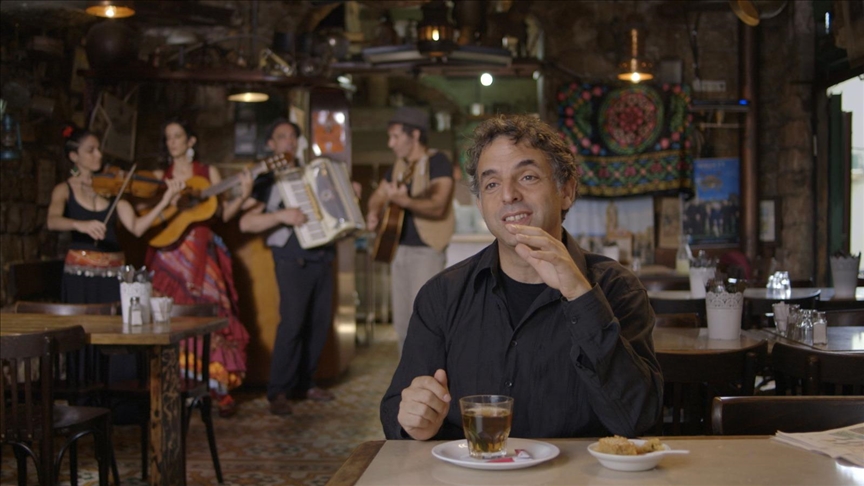ISTANBUL
Happy to be back on Turkish soil after a long absence, acclaimed Israeli short story writer and filmmaker Etgar Keret hailed the common ground he finds with his fans in Türkiye, adding that its cultural capital Istanbul is one of his “favorite places in the world to speak.”
“I always like to go to Istanbul, I must say especially as a writer, because readers here are very warm,” the writer, 54, told Anadolu Agency in an interview ahead of a packed book-signing event at a bookshop on Istanbul’s Asian side.
“They are both sophisticated and generous, but not pretentious. So I really love having events here. It’s really one of my favorite places in the world to speak,” said Keret, who is also known for his dark and funny short stories, graphic novels, and scriptwriting for film and television as well as directing.

Following a two-year delay due to coronavirus, Keret was in Istanbul this May as part of Istanbul’s Pera Museum film screenings by the popular author.
“There are some places where let’s say commercially I can sell more copies but here, I feel that the readers are more involved and more like kind of a cult,” he said. “It’s not even a question of how many people read me but there are people who read me and it matters for them.”
The writer used to be a frequent visitor to Istanbul about a decade ago, as his fans would form long queues in front of bookshops where he has signing events. But Keret said kicking off his directing career for films and TV series, as well as coronavirus, put his travels to the city on pause.
“It almost kind of mythological to come back again, because I have friends here and I have people that I’m close to,” he said.
Explaining his popularity among Turkish fans, Keret said the lives you can see in his stories are “not that different from Turkish people’s life.”
Noting that the angle of his stories might be “much different from German or American life,” he linked Türkiye and Israel as two countries that both the faithful and the secular call home, where they “live together and there’s tension between them.”
Asked about his favorite Turkish writers, Keret admits not dipping into contemporary Turkish literature in several years, but said “I’ve read and admire Orhan Pamuk,” Türkiye’s mainstay Nobel Prize-winning novelist. He also praised award-winning German-Turkish film director Fatih Akin, perhaps best known for the bicultural drama Head On and his music documentary Crossing the Bridge.
Writing during COVID-19
According to Keret, writing during coronavirus “was a very interesting period for a writer” like himself, saying it “felt a little bit like a speculative fiction story.”
“I saw it (as) some kind of opportunity. It’s like a life in this big heavy boat that sails somewhere and coronavirus means that you put an anchor (down) and you stopped,” he explained. “And that means that when we start moving again, we can change our course. Maybe we can improve it.”
“I actually had these hopes … that (the pandemic) will make us feel more like a community, understanding that we’re tackling challenges together,” he said. “I actually felt that there was some kind of social opportunity, but after two years, it didn’t happen the way I hoped it to.”
According to Keret, there is some kind of “very existential spot in human existence,” in COVID-19.
“It inspired me and I’m sure that it inspired many other people,” he said, citing the dark TV comedy Severance, which tells the story of “office workers whose memories have been surgically divided between their work and personal lives,” according to the movie database site IMDb.
“I don’t think they would have made it before the corona, even though it has nothing to do with the virus,” he added, referring to the show’s focus on isolation, similar to the COVID-19 restrictions that people across the world went through.
“This kind of instability and anxiety that we felt through coronavirus, it’s almost like a metaphor for what we feel in contemporary human society,” he said.
Minimalistic stories
Keret’s 1998 short story Kneller’s Happy Campers, which was adapted into the 2006 film Wristcutters: A Love Story, by Croatian director Goran Dukic, became a cult movie for cinephiles, as it is set in the afterlife. Among his works that made it to the big screen, Keret also cited his short story Crazy Glue, which was adapted into both comedy and horror films.
According to Keret, the reason why his works are widely adapted is that they are “very minimalistic,” which really means that when they are adapted, there’s “a lot of space to add to their own mood, color.”
Exhibit to honor late Holocaust survivor mother
Keret’s next project will be about his late mother, Orna, a Holocaust survivor from Poland who died two years ago.
The project is “basically collecting some kind of fragments, memories that I have, a form of her, from my childhood,” he said. It is expected to be “some kind of exhibition.”
He said that he would not want to start it in Israel. “Because I would feel too vulnerable. But I think a good place to start would be either Germany or Poland.”
“So I think that maybe it would be natural to take this kind of story to the place in which she grew up, to the reality that she knew,” he added.
The project is expected to debut later this year or next year, he said, adding: “I can say that I’m pretty much done with the text.”

